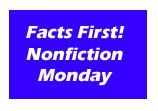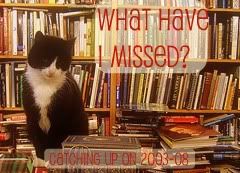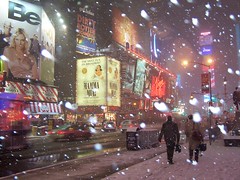"Feminism is a whole state of being. It’s having lenses on your eyes, your ears, all your senses all the time. You’re not a feminist just when you’re doing activism work, you’re a feminist all the time. You’re a feminist when you’re watching a movie, where you decide to go out, the way you make your economic choices. All the smallest details and the biggest details." -
Farah Salka, coordinator for Nasawiya, a feminist group in Lebanon
If you've been reading my blog for any appreciable amount of time, you know by now that I am a huge feminist. Feminism informs pretty much everything I do, which includes what books I read and how I read them.
The ALA has released the
Amelia Bloomer Project list since 2002, highlighting the panel's choices for feminist titles for readers from birth through 18. I find it to be an extremely helpful list, and follow their nominations blog religiously. But for a while I've been wanting to put together my own list, that highlights both my favorite explicitly feminist books, as well as books that may exemplify feminist ideas while not feeling like a traditionally feminist book. By putting this list together, I hope to illustrate that feminism doesn't have just one meaning or purpose, and is in fact a movement and ideal that should be supported by all human beings.
In order to make it onto this list, a book must fit four criteria: 1) must be a young adult novel 2) I have to have read it 3) Must have at least one feminist element 4) I have to like it enough to recommend to others! This isn't an exhaustive list, but I am always taking new suggestions - let me know if you think there's anything I missed!
 Annie on my Mind
Annie on my Mind by Nancy Garden. Farrar, Straus and Giroux, 1982
 Feminist points:
Feminist points: lesbian romance, discrimination based on sexual-orientation
After Liza and Annie cross paths at a museum, the girls find themselves to be inseparable. But their feelings go far beyond friendship, and blossom into a tender romance they feel they have to hide from their friends and family in New York City in the early 1980s. A ground breaking book that holds up extremely well almost 30 years after publication, a subplot about a lesbian teacher being fired due to her sexual orientation doesn't feel so much like historical fiction even today.
Ashes of Roses by Mary Jane Auch. Laurel Leaf, 2002
Feminist points: young woman on her own, women entering workforce, worker's rights
16 year old Rose Nolan immigrates from Ireland to New York City in 1911. Beset by obstacles from the moment she steps off the boat with her family, Rose and her sister end up in the big city on their own, renting a room from a labor organizer, whose daughter arranges for Rose to work with her at the famous Triangle Shirtwaist Factory.
Brooklyn Nine by Alan Gratz. Penguin young readers, 2009
Feminist points: women in sports, education of women
Nine short stories tell the story of nine generations of one family and their connections to baseball, from 1845-2002. Two stories look at women and the game: in 1926, Frankie is a genius when it comes to numbers and loves baseball statistics, but has already decided she won't be going to college because of her gender. In 1945, Kat travels from New York City to the midwest to play for the Grand Rapids Chicks in the All-American Girls Professional Baseball League
Crossing Stones by Helen Frost. Farrar, Straus and Giroux, 2009
Feminist points: US suffrage movement
A novel in verse following 18 year old Muriel Jorgensen, and her family's neighbors the Normans. When Frank Norman - who Muriel is beginning to think of as more than a friend - and Muriel's brother enlist to fight in World War I, Muriel and Frank's sister, Emma, are left to help keep up the home front. When Muriel isn't contemplating the war, she is fascinated by the rapidly-growing suffrage movement, which her aunt is protesting for even as the US goes to war.

 The Disreputable History of Frankie Landau-Banks
The Disreputable History of Frankie Landau-Banks by E. Lockhart.

Hyperion, 2008
Feminist points: Self-identified feminist protagonist, institutional sexism, expression and conceptions of femininity
At 14, Frankie Landau-Banks is a mildly geeky girl attending a highly competitive boarding school. When she comes back for her sophomore year, she's morphed over the summer into a girl with a chip on the shoulder of her knock-out body. Frustrated by her boyfriend's participation in an all-male secret society, Frankie plans epic pranks to show who has the real brains, and hopefully open the minds of her classmates.
Empress of the World and
Rules for Hearts by Sara Ryan Puffin, 2001 and Viking Juvenile, 2007.
Feminist points: strong female friendships, lesbian and bisexual romance
In
Empress, Nicola Lancaster is attending a summer camp for gifted students in order to further her dreams of becoming in archeologist. On the first day she meets the beautiful Battle Hall Davies, and finds herself instantly smitten. Nic wrestles with her conceptions of love and dating and her own identity while learning the important lesson that "words don't always work."
Rules for Hearts picks up Battle's story the summer before she goes to college. She and Nic have broken up on amicable terms, and Battle is now spending the summer living in a co-op house with a Shakespeare theatre company and falling for her roommate Meryl.
Every Little Thing in the World by Nina de Gramont. Atheneum, 2010
Feminist points: abortion, sexual orientation, gendered stereotypes
When 16 year old Sydney discovers she's pregnant, the only person she can tell is her best friend, Natalia, who takes Sydney to a party to confront the father. When the party is busted by the cops, Natalia and Sydney's parents send the girls on a six week camping trip into the Canadian wilderness - and Sydney never has a chance to tell her parents about the pregnancy, or the fact that she's pretty sure she wants an abortion. She spends the trip trying to hide her pregnancy from her fellow campers, and dealing with Natalia's evolving opinions on how the pregnancy should be handled.
Five Flavors of Dumb by Antony John. Dial, 2010
Feminist points: women in entertainment, strong female friendships, disability
When Piper sees the school's latest rock band giving an impromptu concert on the school's front steps, she's drawn to their charisma and spunk - though not their music. Severely deaf, Piper hears only with hearing aids and has never been able to make out much music. So everyone is skeptical when Piper steps up to manage the band. Determined to prove her worth as a manager, and earn extra money for college after her parents raided her college fund to pay for a cochlear implant for her baby sister, Piper must meld the various flavors of Dumb - the diva lead singer, the talentless eye-candy, the surly bassist, the silent guitarist, and musical prodigy drummer - into one coherent sound.
 Flygirl
Flygirl by Sherri L. Smith. Speak, 2009
 Feminist points:
Feminist points: racism, women in traditionally male jobs, women in the military.
Ida Mae Jones wants, more than anything else, to be a pilot like her father. But as an African-American woman in Louisiana in the 1940s, she knows her chances are slim to none. Until she sees an ad for female pilots to join the newly formed Women Airforce Service Pilots to support the US's efforts in WWII. Outside of her hometown, no one will know the girl with a tan is actually a light skinned African-American - or so Ida hopes as she finds herself stationed in Texas, a dangerous place for a woman in her position if she were ever discovered.
Graceling and
Fire by Kristin Cashore. Harcourt Children's, 2008 and Dial, 2009.
Feminist points: choices of children and marriage, sexual harassment, menstruation, generally bad-ass female protagonists
In many ways, Katsa and Fire are two sides of the same coin, facing many similar problems and reacting in different ways. In
Graceling, Katsa is "graced" with almost supernatural killing abilities, making her a useful assassin for her uncle the king. Katsa, however, prefers to use her fighting skills to help those who her abusive uncle would hurt. Teaming up with Po, another Graceling with fighting skills to match Katsa's own, it is up to the pair to defeat a tyrant.
Fire is a prequel to
Graceling and set in a different part of the world, "where monsters come out of the sea and air, and armies burst out of holes in the mountains, and the people are different from anyone we’ve ever known." Fire is half-monster herself, gifting her with psychic abilities as well as cursing her with being devastatingly attractive to both men and monsters who will do anything to have or destroy her. It is a tumultuous time in the Dells as various factions are plotting to overthrow the king. As battlelines are drawn, Fire is drawn into the fight.
Guardian of the Dead by Karen Healey. Little, Brown and Company, 2010.
Feminist points: critiques of mythology, sexual orientation (asexual), multicultural cast
Set at a boarding school in New Zealand, Ellie's life revolves around her best friend Kevin, her crush on Markk, and choreographing fight scenes for a production of
A Midsummer Night's Dream. Until a woman in the play sets her eyes on Kevin, and Ellie worries about her influence on her best friend. Soon Ellie finds herself drawn into the world of Maori mythology - myths that, it turns out, are dangerously real, as the patupaiarehe seek to destroy as many human lives as possible in order to gain their own immortality.

 Mare's War
Mare's War by Tanita S. Davis. Knopf, 2009
Feminist points: racism and sexism in the military, women in the military, female family bonding
Octavia and Talitha are mortified when they learn they're going on a summer roadtrip with their eccentric grandmother, Mare. The girl's can't see past her unconventional name, looks and car - until Mare spends the drive telling them about her service in WWII with the African-American battalion of the Women's Army Corps, lying about her age in order to escape life in the deep South and spending the war in Europe.
The Mockingbirds by Daisy Whitney. Little, Brown Books for Young Readers, 2010
Feminist points: date rape, victim blaming
When Alex wakes up in bed with a guy she barely knows, she quietly starts to panic. As flashes of memory break through her hangover, she realizes a terrible truth: she was date raped. Her elite boarding school, however, seems to be of the opinion that its students can and will do no wrong, so Alex has two choices: keep the incident to herself and avoid the cafeteria where the guy and his buddies snicker about her, or go to The Mockingbirds, the secretive student group, set up to bring justice to Themis Academy students wronged by their peers.
A Northern Light by Jennifer Donnelly. Harcourt, 2003
Feminist points: sexism, classism, racism, education of women, appropriate roles for women
It's 1906 in northern New York and Mattie Gokey's dream is to leave the hardscrabble life on her father's small farm to study writing and live in New York City. But after her mother's death and her brother running away, extra money and hands are what her father needs most. When Mattie convinces him she should take a job at a hotel on the lake, he grudgingly accepts. Mattie continues to dream big, but also recognizes the stability that marrying the handsome Royal would bring. Just as she thinks she might be content somewhere other than the city, hotel guest Grace Brown's drowned body is recovered from the lake. In the face of a life cut tragically short, Mattie must reevaluate her own decisions.
Rampant and
Ascendant by Diana Peterfreund. HarperTeen 2009 and 2010.
Feminist points: women working together, strong female friendships, female family bonding, women warriors, historical roles for women
Unicorns aren't all sparkles and rainbows. They are, in fact, vicious killers who can only be stopped by highly trained female virgin warriors. Unfortunately, it's been 150 years since any woman has trained to fight unicorns, so when unicorn attacks begin out of nowhere, a group of eligible young women are hastily assembled in a former Roman convent. Astrid Llewellyn is the descendant of one of the most successful unicorn hunters ever, but spends most of
Rampant resisting what others are trying to force upon her as her birthright. A young woman of science, Astrid wants to study the unicorns and empirically test the most effective fighting techniques, but is brushed off by the convents sponsors because she is wanted for her fighting skills and nothing else. In
Ascendant, Astrid has mastered her fighting technique, but still wants to apply scientific principles to the unicorns, especially as her best friend's abilities are mysteriously weakening. When given the chance to work with Gordian pharmaceuticals in the French countryside, Astrid leaps at the chance to help her fellow hunters, and possibly even the world if she can help them discover the means to make the much-sought-after Remedy.
Sisters Red by Jackson Pearce. Little, Brown Books for Young Readers, 2010.
Feminist points: work/life balance, sexuality, sisterhood, women warriors
Scarlett March has one purpose in her life: to hunt Fenris, the werewolves that killed her grandmother and took Scarlett's eye while she was protecting her little sister, Rosie. Rosie has never stopped feeling like she owes Scarlett her life, so for years she has aided in the Fenris hunt, even though she's not sure hunting is what she wants to do with the rest of her life. As local Fenris activity is on the rise, and Scarlett's former hunting partner Silas returns to help, the sisters both know they have to be on the top of their game.
 Speak
Speak by Laurie Halse Anderson. Puffin, 1999.
 Feminist points:
Feminist points: rape
It's the beginning of Melinda's freshman year of high school, and she has stopped talking. Not that many people notice - ever since she called the cops while at a party over the summer, everyone at school ignores her. Melinda knows what has silenced her - but questions whether she'll ever have the strength to confront him and recover her voice.
Uglies trilogy by Scott Westerfeld. Simon Pulse, 2005 and 2006.
Feminist points: female friendship, beauty standards, peer pressure
In a future where plastic surgery is mandated for all citizens at 16 in order to match the standards of the Pretty Committee, Tally Youngblood is just counting the days until she turns 16 and can join her best friend Paris as a Pretty. Until she meets Shay, a rebel who would rather not be turned Pretty, and is so committed that the day before her birthday she runs away to live in the woods with a bunch of outcasts Tally isn't even sure exist. Instead of being called in for her surgery, Tally meets with the terrifying Dr. Cable, who orders Tally to follow Shay into the wilderness and bring her and her fellow heretics back to civilization. Tally and Shay's relationship continues to evolve over the trilogy, as they first have to talk themselves out of acting Pretty, before being drafted into Dr. Cable's terrifying Special Circumstances.
Wintergirls by Laurie Halse Anderson. Viking Juvenile, 2009.
Feminist points: Eating disorders, body image
Lia and Cassie were best friends, encouraging each other on their never-ending quest to be thin. But now that Cassie is dead, Lia can only rely on the little voice in the back of her head encouraging her to remain in control, and to keep losing weight.
The Wonder of Charlie Anne by Kimberly Newton Fusco. Knopf, 2010.
Feminist points: sexism, racism, appropriate roles for women
With the Depression looming large, Charlie Anne is devastated when her father must go north to build roads, leaving Charlie Anne and her siblings alone with their cousin Mirabel, who seems determined to become their new mother. In between non-stop chores and scoldings to behave more lady-like, Charlie Anne is fascinated by the new wife her neighbor has brought home. Rosalyn wears bright red pants while the other women wear threadbare homespun dresses. She's also brought with her a young African-American girl, Phoebe, who has lost her mother, just like Charlie Anne. The two girls forge a friendship, in spite of the rudeness and outright hatred of their community.
Last updated: 1/23/11





















